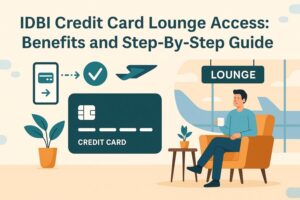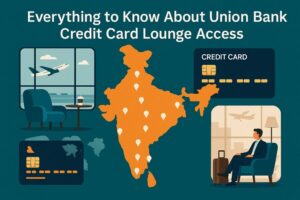How to Get First Credit Card in India: Complete Guide
- 22 Oct 25
- 13 mins
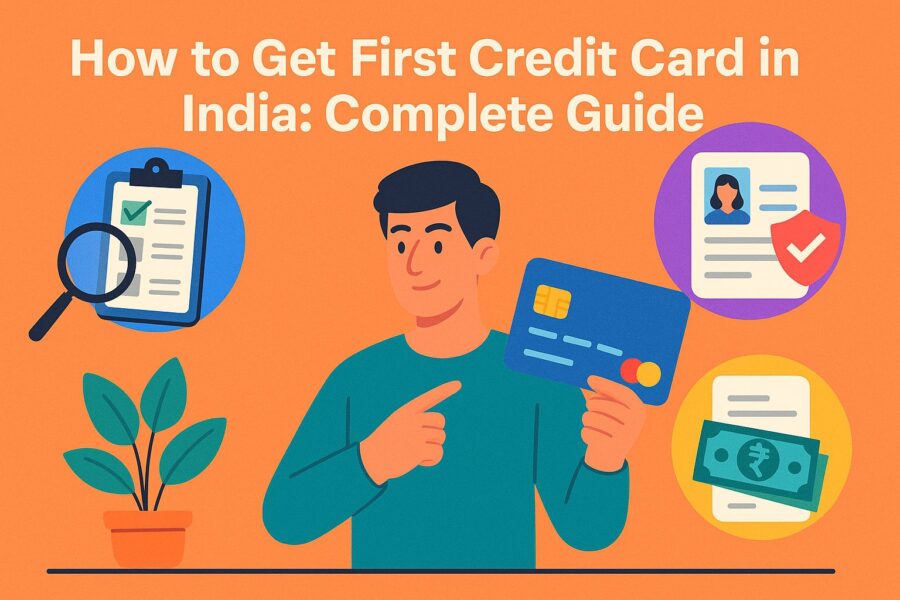
How to Get First Credit Card in India: Complete Guide
- Eligibility Check for Your First Credit Card
- Choosing the Right Credit Card
- How to Start: Step-by-Step Application Process
- 4 Entry-Level Credit Cards You Can Consider
- 8 Key Mistakes to Avoid as a First-Time Credit Cardholder
- 4 Ways to Improve Approval Chances for Getting a Credit Card
- 6 Common Myths About Getting a Credit Card in India
- Conclusion
Key Takeaways
- To understand how to get first credit card in India, ensure you meet the basic criteria—age between 21 and 65 years, Indian citizenship, and minimum income as per bank guidelines.
- Selecting the right card is crucial when learning how to get first credit card in India. Students can go for secured cards against FDs, while salaried individuals can pick entry-level rewards or cashback cards.
- Knowing how to get first credit card in India involves gathering essential KYC and income documents like PAN, Aadhaar, salary slips, or ITR, depending on your employment type.
- A vital part of how to get first credit card in India is understanding responsible usage—avoid missing payments, overspending, or applying for multiple cards at once.
- When exploring how to get first credit card in India, remember that responsible use i.e., timely bill payments and maintaining a low credit utilisation ratio, helps build a strong CIBIL score for future benefits.
Did you know that, according to 2024 reports, there are more than 100 million active credit cards in India? The credit card market has grown with a CAGR of 20% over the last 5 years.
This increasing trend is due to the multiple benefits that credit cards provide. How to get first credit card in India is a question that a person wanting to get one might ask.
To get your first credit card, you need to check your eligibility and sort out your financial needs. Continue reading this article, as it will provide you with a detailed guide on how to obtain your first credit card.
Eligibility Check for Your First Credit Card
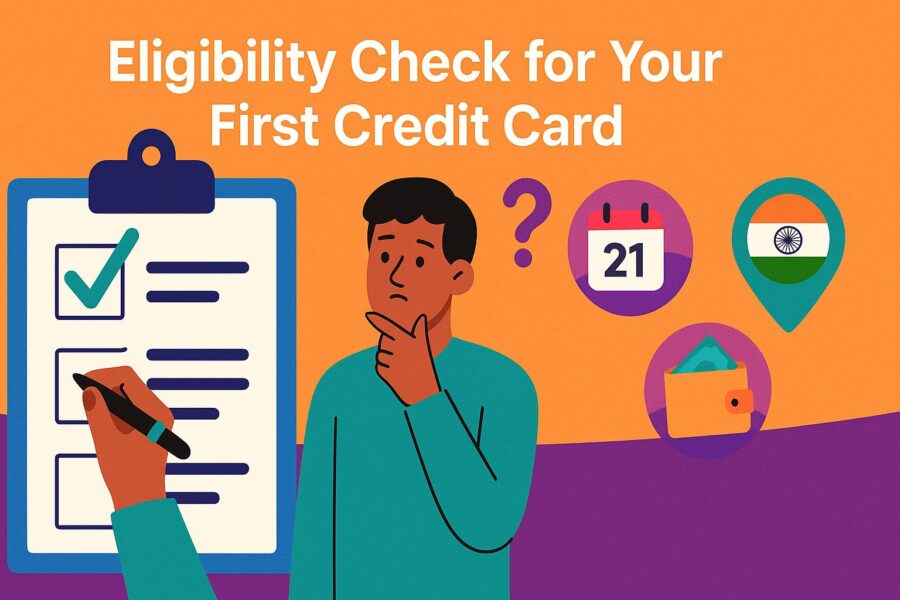
To obtain your first credit card, you will first need to verify your eligibility for a credit card. Every bank has its own set of eligibility criteria that you need to fulfil. However, there are specific standard criteria, which are as follows:
- Age: Maximum credit card requirements specify that the applicant’s age must be between 21 and 65 years.
- Minimum Wage: All banks require a salary above their set threshold to issue a credit card.
- Citizenship: You will also need to be an Indian citizen and live in a serviceable location within India.
It is not mandatory to have a credit score to get your first credit card. However, if you have a good credit score that you have built by making timely payments on a loan, it will help you get your first credit card.
Choosing the Right Credit Card
When you are struggling with the question of how to get first credit card in India, it becomes essential for you to decide which demographic you fall into.
For Students
If you are a student, you must be at least 18 years of age to obtain a credit card. Being a student and having a credit card can help you build an early credit score that can be useful in the future.
Students generally get secured credit cards against a fixed deposit (FD). A few examples of credit cards for students include IDFC FIRST WOW Student Credit Card and Kotak 811 #DreamDifferent Credit Card.
For Salaried or Self-Employed Individuals
There are several credit cards that you can choose from if you are a salaried or self-employed individual. There are categories of cards on the basis of income of a person and the spending limit of a card.
For an earning individual, multiple factors come into play while deciding to get their first credit card, such as income stability and range, fees and charges, credit limit, rewards and benefits, to name a few.
How to Start: Step-by-Step Application Process
Step 1: Select the Credit Card You Want
There are multiple banks that offer credit cards to Indian individuals. A few of them include SBI, HDFC, IDFC, Axis, and more. You will need to select the card that best suits your requirements and eligibility.
For instance, there are credit cards that are specifically designed for travel, recreation, and business activities. Therefore, deciding what purpose you want your credit card to serve will help you determine what you need.
Step 2: Apply for the Card
Then you come to the step of applying for the chosen credit card with the bank that provides it. To apply, please gather your documents. The basic documents required for a first-time credit card application include proof of address, identity, and income.
If you already have an FD, savings account, or other accounts with the bank, some of these documents might not be necessary. You may also need to provide additional documents, depending on the specific card you have selected. To apply for the credit card, you can visit the bank, fill out an online application, or apply through an ATM as well.
Step 3: Activate Your Credit Card for Use
Upon approval of your credit card application comes the next step, which is activating it. You will normally receive your credit card at the address listed in your communication. You will receive your PIN separately. To receive the card, you will need to present valid identification and sign for it.
Nowadays, banks tend to send a ‘Green PIN’, which is directly sent to the registered phone number. Upon receiving both the PIN and the credit card, you can visit your nearest bank ATM to change the PIN for the card. This is a very crucial step as the PIN will authenticate all of your credit card transactions.
💡Pay your credit card bills in an easy and secured way and experience smooth transactions with the PICE App.
4 Entry-Level Credit Cards You Can Consider
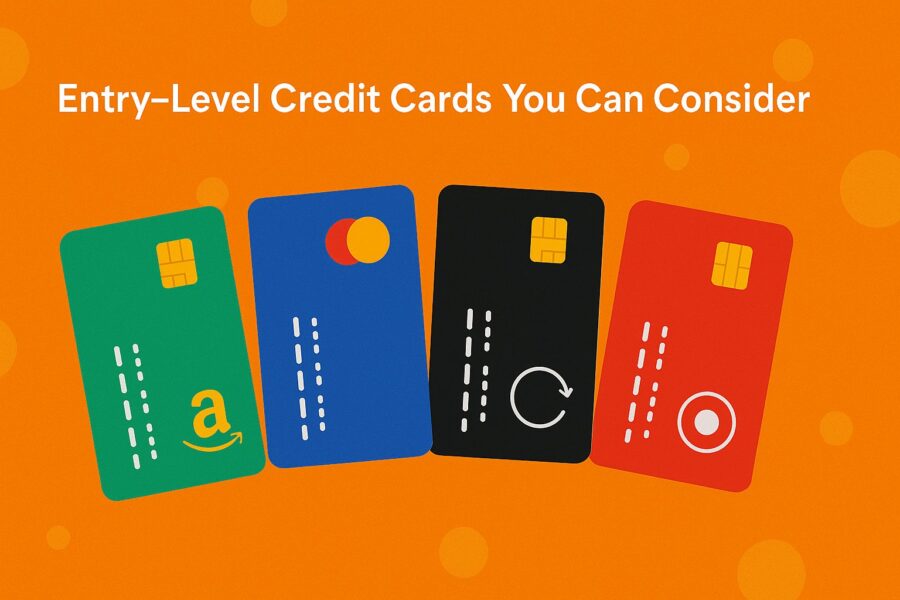
After knowing how to get first credit card in India, here is a list of 4 entry-level credit cards that you can get to start your credit card journey:
- Amazon Pay ICICI Bank Credit Card
| Joining Fees | NIL |
| Annual Charges | NIL |
| Features | Surcharge waiver on fuel purchasesReward points for every ₹100 spent on AmazonDining discounts |
| Eligibility | Over 21 yearsMinimum monthly income of ₹20,000 for salaried individualsMinimum annual income of ₹3,60,000 for self-employed individuals |
- HDFC MoneyBack+ Credit Card
| Joining Fees | ₹500 + taxes |
| Annual Renewal Fee | ₹500 + taxes |
| Features | 10x CashPoints on Flipkart, Amazon, Swiggy, and morePay the credit card bill for 50 days with 0 interest rates₹500 gift voucher upon spending ₹50,000 per quarter |
| Eligibility | Monthly income more than ₹20,000 for salaried individualsMinimum Income Tax Return (ITR) of ₹6,00,000 for self-employed individuals in a yearAge for salaried individuals needs to be minimum 21 and maximum 60 yearsAge for self-employed individuals needs to be minimum 21 and maximum 65 years |
- Axis Bank ACE Credit Card
| Joining Fees | ₹499 (NIL for a few select channels for a limited time) |
| Annual Charges | ₹499 (NIL of yearly spend is more than ₹2,00,000) |
| Features | Cashback on all spend4 complimentary lounge access per year (international lounge access not included)Surcharge waiver on fuel purchases |
| Eligibility | Age should be between 18 and 70 yearsDocument required includes PAN card, colour photo, income proof (salary slip), residence proof (Aadhaar Card), and identity proof (Aadhaar Card) |
- Simply CLICK SBI Card
| Joining Fees | ₹499 + taxes |
| Annual Charges | ₹499 + taxes |
| Features | Amazon gift card on annual fee paymentGet e-shopping rewardsAnnual fee charge waiver for the next year upon spending ₹1,00,000 in a year |
| Eligibility | Age should be between 21 and 70Applicant must be an Indian citizenMust have a stable source of income |
For up-to-date charges and other card-specific details, please visit the official page of each bank.
8 Key Mistakes to Avoid as a First-Time Credit Cardholder
- Missing Payments
Failing to settle outstanding dues on time can harm your credit score. Always repay the full amount instead of only the minimum to prevent interest charges and debt accumulation.
- Overspending Beyond Limit
Exceeding 30% of your sanctioned credit reduces your creditworthiness. If you need additional funds, request a higher limit instead of maxing out your card.
- Ignoring Utilisation Balance
Not using your card at all also affects your CIBIL score. Use it moderately within the recommended limit to maintain a healthy utilisation ratio.
- Handling Too Many Cards
Opening several cards at once may signal risky behaviour. Gradually build your portfolio and manage each account responsibly to strengthen your credit history.
- Losing Track of Expenses
Unmonitored spending leads to financial strain. Track your expenses consistently and set transaction caps to control impulse purchases.
- Neglecting Statement Reviews
Skipping monthly statement checks risks billing errors or fraud going unnoticed. Make sure to regularly review your statements to help verify charges and avoid penalties.
- Delaying Credit Card Bill Payments
Delayed payments can result in late payment fees and interest, while also lowering your CIBIL score. Set reminders or enable auto-pay to clear bills before the due date and avoid late payment charges.
- Ignoring Rewards and Offers
Overlooking reward points and offers can reduce the value of your card. Redeem points wisely and leverage discounts to maximise benefits.
4 Ways to Improve Approval Chances for Getting a Credit Card
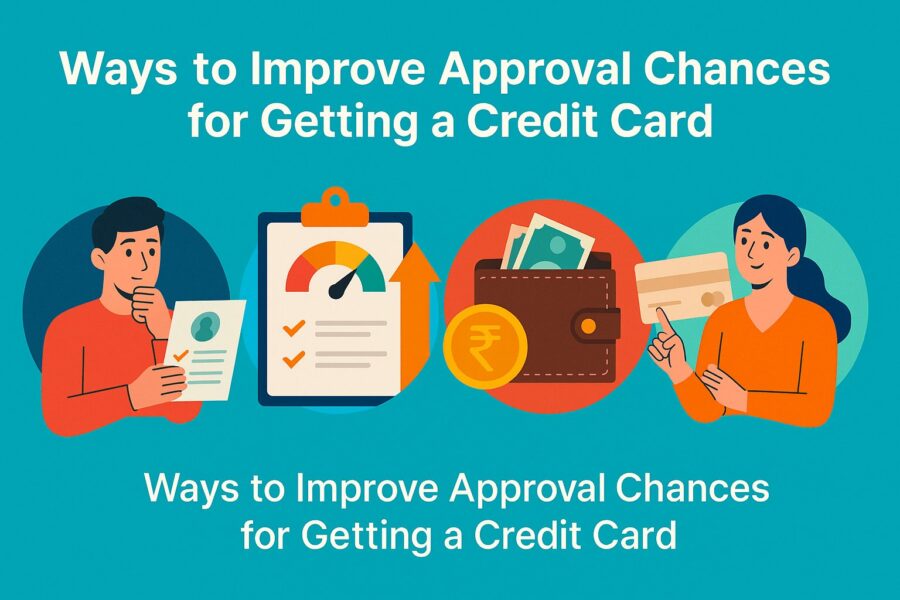
- Apply According to Your Profile
Credit cards come in different categories with varied limits and features. A student might need a different kind of credit card as compared to an office goer. So, analysing your financial profile before applying improves the probability of approval.
For example, if you maintain a strong credit score and frequently travel abroad, you can opt for a card that supports multiple currencies and provides lower foreign transaction charges. Always align the card you select with your lifestyle and financial habits to make sure that you get greater financial support.
- Maintain Good Past Credit
Banks and financial institutions evaluate your overall credit history before approving new cards. If you are new to the world of credit cards, you might not have any idea about a credit score and a credit history. However, if you have taken any kind of loan, such as a personal or business loan, before or have bought things on EMIs, then your CIBIL score might be a thing.
Always responsibly repay your loans. This demonstrates financial discipline and helps build a balanced credit portfolio. This discipline not only strengthens your score but also enhances the credibility of your application, which can speed up card approvals.
- Keep Debt-to-Income Ratio Low
Lenders assess your repayment ability by analysing the ratio of your debt compared to your income. If your debt-to-income ratio appears high, your approval chances decrease significantly. This is because it shows financial management irresponsibility on your part.
Keep in mind that your liabilities should be well below your income level to demonstrate financial responsibility and stability. Demonstrating control over borrowings reflects positively on your repayment capacity and makes your application stronger. The lower the percentage of debt, the easier it becomes to secure a credit card.
- Avoid Submitting Multiple Applications
Submitting multiple applications at once signals financial stress and a desperate attempt to obtain a credit card. Credit card issuers interpret such behaviour as high risk and often reject requests.
Banks also rarely approve more than one card application at a time. This may leave you without approval if you submit applications for multiple cards simultaneously. Instead, apply strategically for one card that fits your requirements and credit profile, then build on that foundation over time.
6 Common Myths About Getting a Credit Card in India
Myth 1: Your Credit Score Can Get Low if You Check it
This is one of the common misconceptions that checking your credit score will lower it. In reality, if you check your own credit score, it is something called a soft enquiry. A soft enquiry does not have any effect on the credit score whatsoever. However, your credit score may decrease if lenders check your credit report or conduct a hard inquiry.
Myth 2: Credit Score Increases if You Close Old Accounts
Closing all of your old accounts might seem like a simple and easy way to increase your credit score. But it can also be harmful and negatively impact your credit. For instance, your credit utilisation ratio can increase if you close your old accounts, and this can lead to a lower credit score.
Myth 3: Having More Credit Cards Always Decreases Your Credit Score
It is always advised for a first-time credit card user not to have multiple cards. This is because a new credit card user might not know how to manage multiple cards, which can lead to a decrease in credit score. With time, having more credit cards and being able to manage them reflects high credit responsibility.
Myth 4: Your Credit Score Immediately Increases Upon Paying Off Debts
Multiple factors, including payment history and credit utilisation ratio, determine your credit score. So, no, if you pay off your debts, it will not immediately increase your credit score. But its effects will slowly reflect on your score as time goes by. Maintaining a good credit score involves keeping all of the parameters that impact the score in check.
Myth 5: Credit is Not Impacted by Co-signing For a Loan
Co-signing a loan can impact your credit score negatively if the person with whom you have signed for the loan shows irresponsible payment behaviour. This means that if the primary borrower of the loan misses any payment deadlines, it can negatively impact your credit report. Therefore, it is advisable to understand all of the associated risks before co-signing for a loan.
Myth 6: Checking Credit Score is Difficult
Facing difficulties in checking your credit score is a thing of the past. In today’s world, you can check your CIBIL score within minutes. You can do so through the official website of credit bureaus such as CIBIL, Equifax, or CRIF High Mark.
Conclusion
If you are struggling with the question of how to get first credit card in India, you can simply check your eligibility and analyse your financial needs. After you have chosen the credit card that would suit your needs, you need to apply for it and get approval.
There are several cards you can go with, such as Amazon Pay ICICI Bank Credit Card, HDFC MoneyBack+ Credit Card, and more. Never forget the financial responsibility that comes with having the card.













